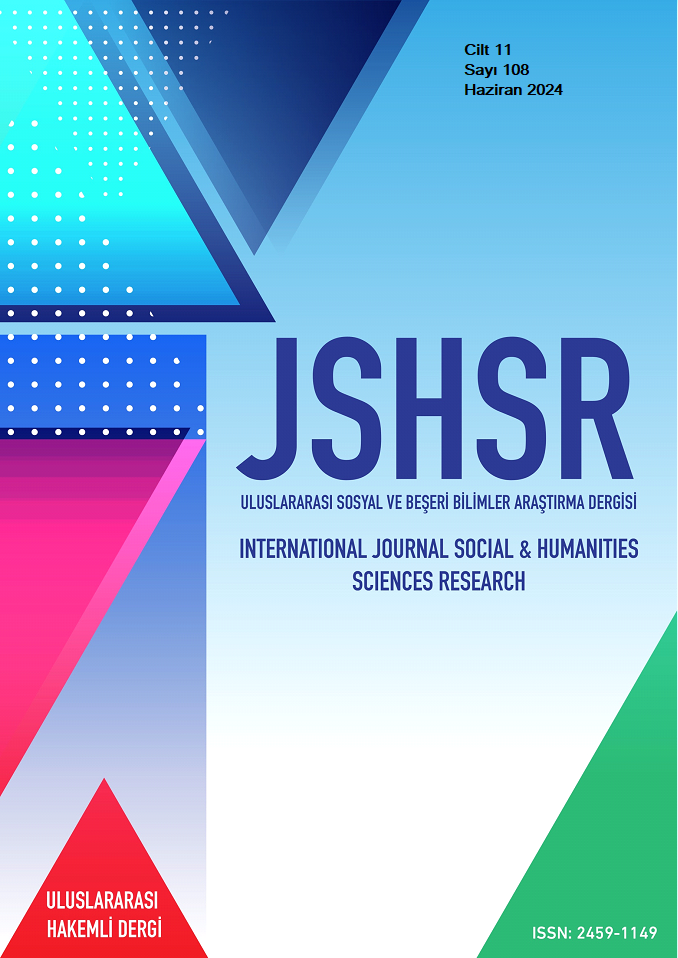Teaching Competency Level Inquiry: Social Studies Teacher Candidates
DOI:
https://doi.org/10.5281/zenodo.12603385Keywords:
Competency, competence, professional attitudeAbstract
Knowing that the quality of education in a country is proportional to the quality of its teaching staff, it is necessary to attach importance to the education of teacher candidates. It is not possible to ignore the impact of teachers' idealism on their qualifications. Another point that will reveal this idealism is the beliefs that teachers develop regarding their own professional competence. “Will I be a good teacher?” With this question, prospective teachers question their professional competencies, and the answers they give either open or close the path to qualified teaching. This study aims to understand the teaching competence level of social studies teacher candidates; It includes an inquiry into the training of qualified social studies teachers. The study was conducted with 192 Social Studies teacher candidates studying at Gazi University Faculty of Education with a descriptive survey design, one of the quantitative research methods. "Ohio Teacher Competency Scale" adapted to Turkish by Baloğlu and Karadağ (2008) was used to collect research data. In the research, frequency, percentage and arithmetic mean were calculated from descriptive statistical methods, and t test was conducted to examine the difference between groups. According to the research results; The teaching competence level of social studies teacher candidates was determined to be above average in the sub-dimensions of teacher guidance, behavior management, motivating, teaching skills and measurement-evaluation. It was observed that there was no significant difference in the relationship between social studies teacher candidates' teacher competency levels and gender and grade level variables.
References
Altan, M. Z., & Özmusul, M. (2022). Geleceğin Türkiye’sinde öğretmen refahı: Öğretmenlik meslek kanununun kayıp parçası. Ahmet Keleşoğlu Eğitim Fakültesi Dergisi, 4(1), 24-42.
Altunay, F. (2018). Sosyal bilgiler öğretmen adaylarının öğretmenlik mesleğine ilişkin tutumlarının ve mesleki benlik saygılarının çeşitli değişkenler açısından incelenmesi. [Yayınlanmamış Yükseklisans Tezi]. Eğitim Bilimleri Enstitüsü, Niğde Ömer Halisdemir Üniversitesi.
Aydemir, S., & Çam, Ş. (2015). Lisansüstü öğrencilerinin lisansüstü eğitimi almaya ilişkin görüşleri. Turkish Journal of Education, 4(4), 4-16.
Baloğlu, N., & Karadağ, E. (2008). Öğretmen yetkinliğinin tarihsel gelişimi ve Ohio öğretmen yetkinlik ölçeği: Türk kültürüne uyarlama, dil geçerliği ve faktör yapısının incelenmesi. Kuram ve Uygulamada Eğitim Yönetimi, 56(56), 571-606.
Bandura, A. (1977). Self-efficacy: Toward a unifying theory of behavior change. Psychological Review, 84, 191-215.
Bandura, A. (1998). Exploration of fortuitous determinants of life paths. Psychological Inquiry, 9, 95-99.
Berman P., & McLaughing M. (1977) Federal programs supporting educational change, Vol.2: Factors affecting implementation and continuation. Rand Corporation.
Büyüköztürk, Ş. (2012). Veri analizi el kitabı. Pegem Akademi Yayınları.
Elvan, D., & Mutlubaş, H. (2020). Eğitim-öğretim faaliyetlerinde teknolojinin kullanımı ve teknolojinin sağladığı yararlar. Mustafa Kemal Üniversitesi Eğitim Fakültesi Dergisi, 4(6), 100-109.
Göçen, G., & Kabaran, H. (2013). Ortaöğretim 9. sınıf fizik dersi öğretim programlarının tarihsel süreç içerisinde karşılaştırmalı olarak incelenmesi. Fen Bilimleri Öğretimi Dergisi, 1(2), 147-157.
Güven, B., & Ersoy, E. (2007). Sınıf öğretmeni adaylarının hayat bilgisi ve sosyal bilgiler. Pamukkale Üniversitesi Eğitim Fakültesi Dergisi, 21(21), 15-32.
Karahan, N. (2008). Öğretmen yetiştirme düzeni ve Türkiye örneği. [Yayınlanmamış Yükseklisans Tezi]. Sosyal Bilimler Enstitüsü, Beykent Üniversitesi.
Karasar, N. (2009). Bilimsel arastırma yöntemi: Kavramlar-ilkeler-teknikler. Nobel Yayın Dağıtım.
Kayıran, M. (1998). Atatürkçü düşünce ışığında: Çağdaş eğitim. Atatürk Araştırma Merkezi Dergisi, 14(42), 780-830.
Pamukoğlu, İ. (2021). Sosyal bilgiler öğretmen adaylarının öğretmenlik mesleğine yönelik öz yeterlilik algısı. [Yayınlanmamış Yükseklisans Tezi]. Sosyal Bilimler Enstitüsü, Balıkesir Üniversitesi.
Reddin, W. J. (1971). Managerial effectiveness 3D. Mc Graw-Hill.
Oçan, E., Koçdemir, U., Yolcu, S., & Çevik, Y. (2024). Branş öğretmenlerinin 21. yüzyıl eleştirel düşünme becerileri yeterliklerinin incelenmesi. International Journal of Original Educational Research, 2(1), 263-276.
Rotter, J. B. (1966). Generalized expectancies for internal vs. external control of reinforcement. Psychological Monographs, 80, 1-28.
Sağır, H., (2006). Yetkinlik bazlı insan kaynakları süreçleri ve bir araştırma. [Yayınlanmamış Yükseklisans Tezi]. Sosyal Bilimler Enstitüsü, Marmara Üniversitesi.
Tschannen-Moran, M., & Woolfolk-Hoy, A. (2001) Teacher efficacy: Capturing anelusive concept. Teaching and Teacher Education, 17, 783-805.
Ünsal, S., & Gökdaş, A. (2020). Eğitimin işlevlerinin gerçekleşme düzeyinin öğretmen algılarına göre incelenmesi. Cumhuriyet Uluslararası Eğitim Dergisi, 9(4), 1133-1157.
Yetişensoy, O. (2019). Sosyal bilgiler öğretmen adaylarının geleceğe yönelik işsizlik kaygısı düzeyleri ile öğretmenlik mesleğine ilişkin tutumları arasındaki ilişkinin incelenmesi. [Yayınlanmamış Yükseklisans Tezi]. Eğitim Bilimleri Enstitüsü, Atatürk Üniversitesi.
Downloads
Published
How to Cite
Issue
Section
License
Copyright (c) 2024 INTERNATIONAL JOURNAL OF SOCIAL HUMANITIES SCIENCES RESEARCH

This work is licensed under a Creative Commons Attribution 4.0 International License.


